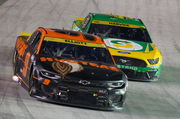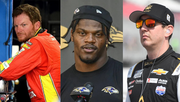
USA Today via Reuters
Apr 23, 2023; Talladega, Alabama, USA; A multi-car wreck begins from contact between NASCAR Cup Series driver Bubba Wallace (23) and NASCAR Cup Series driver Ryan Blaney (12) on the final lap at Talladega Superspeedway. Mandatory Credit: Vasha Hunt-USA TODAY Sports

USA Today via Reuters
Apr 23, 2023; Talladega, Alabama, USA; A multi-car wreck begins from contact between NASCAR Cup Series driver Bubba Wallace (23) and NASCAR Cup Series driver Ryan Blaney (12) on the final lap at Talladega Superspeedway. Mandatory Credit: Vasha Hunt-USA TODAY Sports
The YellaWood 500 is a race fans won’t forget anytime soon, thanks to the massive wreck. With five laps left, “The Big One” struck Talladega, taking out 28 cars. A push from Brad Keselowski’s No. 6 to Austin Cindric’s No. 2 triggered the chaos, sending Cindric spinning and setting off a massive pileup. For many drivers aiming for a crucial points payout—and one Team Penske driver in desperate need of a win to advance—the crash was a heartbreaking end. The colossal wreck in Turn 3 once again brought NASCAR’s DVP Rule into play, as Talladega’s wild reputation held.
Initially, Brad Keselowski took the blame, but SMT data later revealed it was actually Harrison Burton and Joey Logano who triggered the 28-car pile-up. NASCAR’s choice to let drivers keep racing stirred up even more controversy.
This year, two races took place at Talladega Superspeedway—one in April and one in October. While April’s GEICO 500 was broadcast by FOX Sports, last weekend’s YellaWood 500 aired on NBC. Interestingly, despite the playoff stakes, NBC drew over a million fewer viewers than FOX, showing a notable dip in audience engagement.
ADVERTISEMENT
Article continues below this ad
How much difference does a broadcaster make to NASCAR?
“We are thrilled that the NASCAR champion will continue to be crowned on our platforms for years to come,” said Rick Cordella, president of NBC Sports, as reported by NASCAR.com press release. Cordella further added, “Whether it’s the unpredictability of a superspeedway, a Playoff cutoff race, or the championship finale, NBC Sports will use its wide array of platforms to present the dramatic conclusion to every NASCAR season for what will be 17 years at the end of this extension.” But turns out, they are already lagging.
The choice of broadcaster clearly affects NASCAR’s viewership. FOX drew 4.307 million viewers for Talladega, while NBC’s playoff race broadcast attracted only 3.127 million, despite a dramatic 28-car wreck. A recent post on X showed that NBC’s coverage did capture a sizable audience, but it still fell over a million short of FOX. Fans are now questioning why a crucial playoff race saw such a drop in viewership, highlighting how much impact the broadcaster can have on fan engagement. Even with high stakes, the YellaWood 500 couldn’t match the excitement seen on FOX.
Despite the fall in viewership, another post on Reddit had a year-over-year graph of Race number 31 at Talladega, and the stats show an increase of 25% in viewership compared to last year.
NASCAR Cup Talladega Sunday on NBC: 3.127m
NASCAR Xfinity Saturday on the CW: 917K— Sports TV Ratings (@SportsTVRatings) October 8, 2024
What’s your perspective on:
Is NASCAR's viewership drop a sign that multiple broadcasters are diluting the fan experience?
Have an interesting take?
Even in comparison to the April race at Talladega, the stats from FOX’s broadcast show that there has been a 5% drop in viewers compared to last year. But here is where NASCAR fans can rejoice, as despite the drop in viewers, NASCAR remains the second most watched sport of the weekend after the two NBA playoff games driving fans.
ADVERTISEMENT
Article continues below this ad
Trending
What’s under the new broadcaster deal for 2025?
FOX Sports and NBC Sports are the primary broadcasters for NASCAR Cup Series races, with each network airing 14 events per season. Next year, this deal will change with the inclusion of Amazon Prime Video and Warner Bros. Discovery to the broadcaster list.
“Our goal was to secure long-term stability with an optimised mix of distribution platforms and innovative partners that would allow us to grow the sport while delivering our product to fans wherever they are – and we’ve achieved that today,” said NASCAR president Steve Phelps after the sport signed the 2025-2031 media rights deal.
ADVERTISEMENT
Article continues below this ad
As of now, it’s difficult to tell if the impact on the sport will be positive or negative. Each of the broadcasters brings thousands, if not millions, of viewers, and the move to add Prime and Discovery was to expand the sport. “These agreements not only show NASCAR’s importance to the sports and entertainment ecosystem, but also the willingness of some of the world’s largest and most respected media companies to make significant investments in America’s leading motorsport,” said Brian Herbst, NASCAR’s senior VP, media and productions.
However, the effects of having multiple broadcasters have been both a boon and a bane for the sport, and only time will tell how having a total of 4 broadcasters will affect its viewership. One thing to note is that having the race streamed on different networks throughout the season will mean that fans need to be subscribed to their channels, which might make some fans pull away from the idea.
Have something to say?
Let the world know your perspective.
ADVERTISEMENT
ADVERTISEMENT
ADVERTISEMENT
ADVERTISEMENT








Is NASCAR's viewership drop a sign that multiple broadcasters are diluting the fan experience?